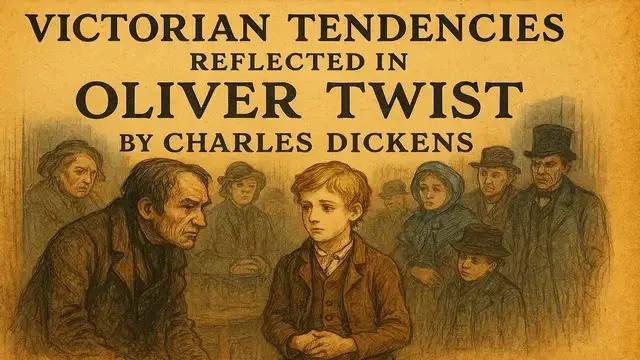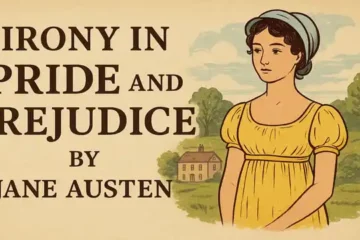Dickens’ Novels Implanted on Solid Ground:
Charles Dickens’ novels are renowned for their strong element of social criticism, and Oliver Twist is no exception. Reflecting Victorian tendencies, Dickens avoids abstract imagination and grounds his fiction in the harsh realities of mid-nineteenth-century society. His focus remains on contemporary issues, familiar settings, and the struggles of ordinary people. Oliver Twist stands as a powerful protest against the oppressive practices of Victorian England, exposing poverty, crime, and social injustice. The novel vividly portrays the dark and claustrophobic world of the poor, emphasizing the moral decay and exploitation that characterized much of Victorian society.
The Most Glaring Problem of the Workhouses:
In Oliver Twist Dickens has drawn a very pathetic picture of the workhouse where Oliver and other orphans were housed. Mr. Bumble, the beadle was more interested in his cocked hat, gilded coat and dignity. He often used to eat hot toast and drink gin with the lady of the workhouse while the children were starved. Mrs. Mann, the superintendent of the workhouse was a food philosopher. She knew what was good for herself and her children. She served her children the smallest portion of the weakest possible good. Since her children were in the growing age, they had the appetite of a wolf. But they were served three bowls of watery gruel per day and starved. They got an onion twice a week and half a bread roll on Sundays. When Oliver demanded more food on the day of his ninth birthday, he was beaten up and discharged from the workhouse.
Demand for Outdoor Relief:
The indoor relief given in the parish workhouse could not satisfy the paupers on account of corruption and harsh treatment of the inmates by the parish authorities. There was a demand for outdoor relief. On account of bad harvest and extreme cold winter, the poor people demanded not only bread but also shelter, blankets and coal. The homeless people lay in the streets without supper and proper clothes in the cold winter nights and died in such a large number that even coffins and grave – diggers were scarce. Oliver’s mother was found lying in the street in a critical condition and brought to a parish workhouse. Mr. Sowerberry, the coffin maker could not meet the demand of coffins in London.
The outdoor relief programme was also turned into a farce by the parish authorities. The needy never got what actually they required. The poor people got loafs when they demanded coals. There were served slices of cheese when they wanted blankets to pass their wintry nights.
Attacks on the World of Criminals:
Dickens makes a scathing attack on the world of criminals. This world fixed its eye on the miserable, neglected, unprotected and starved children. The gangsters like Fagin, the Dodger, and Sikes threw their net around such innocent creatures. Dickens takes the world of such ruffians within the compass of his social criticism. He describes the deep and dark slum world with intense imagination. He creates a dark and confined world in which lurks the smoky fetid thieves’ kitchen where the Artful Dodger leers and Fagin grins in mirth through the greasy air.
Children as Paid Mourners:
Dickens exposes the most abominable practices of this side of the Victorian Society. In the novel, we find highly moving description of funerals in which children were used and employed as paid mourners. Dickens gives a description of a poor woman who had died of starvation. Her old father and mother rave dementedly. The funeral is arranged by Mr. Sowerberry. The priest is late. The bier is on the brink of the grave. The ragged boys attracted by the spectacle play a noisy game of hide and seek and jump backwards and forwards over the Coffin. Mr. Sowerberry and Bumble sit by the fire with the clerk and read paper. The old man and woman wait in the dump clay, with a cold rain drizzling down. The clergyman comes after an hour, reads as much of the burial service as he can compress in four minutes and walks away. The undertaker asks Oliver how he likes all this. The boy replies, “Not very much, Sir”. “Ah, you’ll get used to it in time, Oliver.” said Sowerberry. “Nothing when you are used to it, my boy”.
Presenting the Insolent Magistrate:
The social abuses of the contemporary society have been exposed by the novelist with full sincerity. The court of Mr. Fang is a fine example. Dickens exposes the callous attitude of the courts through this episode. The insolent magistrate is presented in his utmost impoliteness, haughtiness and callousness to the sufferings of the wretches, who are unfortunate enough to have come to Mr. Fang’s dispensary of summary justice.
Rise of Spirit of Humanitarianism:
Hungry, poverty and misery widely spread in the country aroused the spirit of humanitarianism among the sell – to – do people. Mr. Brownlow, Mrs. Maylie and Miss Rose Maylie treated Oliver kindly on account of their humanitarian spirit and change of their attitude to the economic offenders. They believed in the essential goodness of man and tried to relieve people of their miseries.




